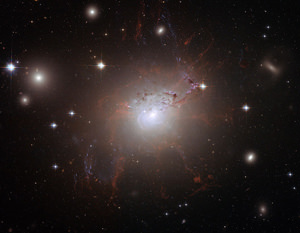A New Twist in the Quest for Extraterrestrials
A young biochemist has caused a ruckus in the scientific community with her claim that one of the basic elements in the formula that has long been considered to define the building blocks of life may be swapped out -- and for arsenic, no less.
A young biochemist has caused a ruckus in the scientific community with her claim that one of the basic elements in the formula that has long been considered to define the building blocks of life may be swapped out — and for arsenic, no less.
Felisa Wolfe-Simon made the game-changing discovery in the form of a special kind of bacterium that could put her colleagues on the hunt for different kinds of life forms on Earth and, potentially, elsewhere in the universe. –KA
Your support matters…The Washington Post:
But now researchers have uncovered a bacterium that has five of those essential elements but has, in effect, replaced phosphorus with its look-alike but toxic cousin arsenic.
[…] The Mono Lake discovery highlights one of the central challenges of astrobiology—knowing what to look for in terms of extraterrestrial life. While it remains uncertain whether the lake’s microbes represent another line of life, they show that organisms can have a chemical architecture different from what is currently understood to be possible.
“One of the guiding principles in the search for life on other planets, and of our astrobiology program, is that we should ‘follow the elements,’ ” said Ariel Anbar, an ASU professor and biogeochemist. “Felisa’s study teaches us that we ought to think harder about which elements to follow.”
Independent journalism is under threat and overshadowed by heavily funded mainstream media.
You can help level the playing field. Become a member.
Your tax-deductible contribution keeps us digging beneath the headlines to give you thought-provoking, investigative reporting and analysis that unearths what's really happening- without compromise.
Give today to support our courageous, independent journalists.





You need to be a supporter to comment.
There are currently no responses to this article.
Be the first to respond.